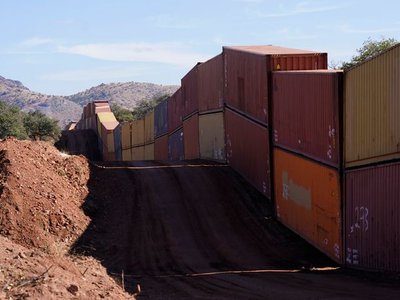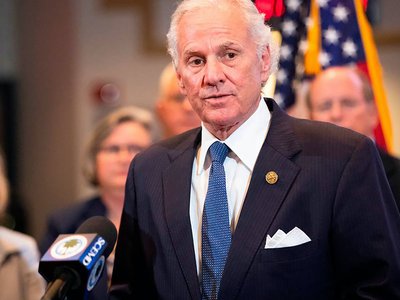Last year, California’s population decreased for the first time in recorded history and it lost a congressional seat. The state is starting to develop a two-tiered society, with higher-income, educated tech workers clustering in the major coastal cities while lower-income, less-educated workers are relegated to the interior of the state or forced out altogether. Now, a new study finds that business headquarters are also leaving the state at a record pace.
For decades, California was the state of opportunity within the land of opportunity. People from east of the Mississippi, lured by California’s exceptional climate, geographic beauty, and economic opportunities, moved there in droves: Its population grew by 10% or more in every decade from 1850 to 2010.
Now, like its famous raisins, opportunity in California looks to be drying up. From 2000 to 2020, California experienced a net loss of 2.6 million people to other U.S. states. Its total population was propped up by natural population increases and strong foreign immigration, but in 2020 foreign immigration decreased and the state’s birth rate continued its steady decline. As a result, California’s total population fell by 182,000 people.
A new study finds that business headquarters are also leaving California, and at an increasing rate. Economist Lee Ohanian of the Hoover Institution at Stanford University and Joseph Vranich, president of the site selection consulting firm Spectrum Location Solutions, collected data on the relocation of California business headquarters from January 2018 to June 2021. As shown in the table below, they documented 265 headquarter relocations over the three-and-a-half-year period, or an average of six relocations per month.
This may not seem like a lot, but as the authors note, this is an undercount since many relocations are not made public, especially those of less newsworthy, often smaller companies.
More worrying for California than the actual number is the trend. There were more relocations in the first half of 2021—74—than in all of 2018 or 2020, and the monthly average in 2021 so far—12—is double the overall average of six. So, while reported relocations slowed down during the pandemic, they are accelerating as the economy reopens. It’s unclear whether this is the new normal, but it’s not a good sign for California.
Some of the more notable companies to leave California during this period are Apple (its America’s headquarters moved from Santa Clara to Austin, TX), Nestle USA (Los Angeles to Arlington, VA), and Oracle (San Mateo to Austin, TX). The table below shows the most popular destination states, led by Texas, Tennessee, and Arizona.
While it’s not surprising to see Texas at the top, the destination states are all over the country: the Midwest (Indiana and Minnesota), the south (Florida and Georgia), the mountain states (Colorado and Idaho), and other western states (Arizona and Oregon).
The authors provide a variety of reasons for why companies move their headquarters out of California.
First, California has some of the highest taxes in the country. The Tax Foundation ranks California 49th on its state business tax climate rankings. Only New Jersey has a worse tax climate.
The state also has one of the worst legal environments. Laws such as the Private Attorney General Act enable employees to file civil suits against employers on behalf of themselves, other employees, or even the State of California. As explained in the study, these laws don’t do much to protect employees, but they create an abundance of costly lawsuits filed by overzealous lawyers.
California is also the most regulated state in the country. According to the Mercatus Center at George Mason University, California has 396,000 regulatory restrictions. New York has the second-highest number of restrictions at 296,000. Regulations raise the cost of running a business and, all else equal, more regulation reduces economic growth.
One way regulation permeates California’s economy is via permits and licensing. As the study reports, California’s permits and licenses “range from “Air Permits,” “Furniture or Bedding Manufacturer’s License,” “Importer’s License,” “Industrial Activities Storm Water General Permit,” “Medical Device Manufacturing License,” “Building and Construction Permit,” “Burglar Alarm Permit,” “Industrial Wastewater Discharge Permit,” “Public Health Operating License/Permit,” “Underground Storage Tank Permit,” among others.”
Permitting frustrations can be the straw that breaks the camel’s back. The study provides an example:
“In San Clemente, Orange County, a company applied for a permit to build a walkway between two buildings to allow forklift drivers to avoid driving through an alleyway. Separate owners of the two leased buildings agreed to the walkway – which the tenant would pay for – and if any complaints were made they weren’t relayed to the company. The permit for a simple operational and safety improvement was denied. “Why should we stay here?” asked a company vice president, saying “It was one more thing that turned us sour on California.” Eventually, the firm moved its entire facility, headquarters and warehouse to Florida and no longer has a presence in California.”
California also has some of the highest prices in the country. The U.S. Energy Information Administration ranks California 48th for commercial operation energy cost per kilowatt hour (kWh). Only Alaska and Hawaii are more expensive. Florida’s cost of $9.35 per kWh is only about half of California’s $17.20. High energy prices raise the cost of operating business, so it’s not surprising companies prefer lower cost states.
In general, prices in California are 16% higher than the U.S. average according to the BEA’s regional price parities. Again, only Hawaii has higher prices, and consumer goods need to cross the Pacific Ocean to get there.
Nowhere are California’s high prices more obvious than housing. The typical home value in California is $683,996, second only to—you guessed it—Hawaii’s $730,511. High housing prices, caused in large part by restrictive zoning laws, and high prices for other goods and services make it hard for people of modest incomes to live in California.
Of course, no one likes high prices, so California’s high cost of living deters some higher income people from living there as well. For businesses, California’s high cost of living makes it harder to attract and retain employees.
While this study focuses on California, it has national implications. For the last decade, businesses and people have been leaving California for other states, particularly Texas. In other words, they have been voting with their feet for the public policies that have made Texas affordable for residents and a great place to run a business.
If we want America to remain as attractive on the international stage as Texas is on the national stage, we should adopt policies that make us more like Texas and less like California. Unfortunately, the Biden administration and Congress are trying to turn the country into California, complete with higher taxes, more regulation, and higher prices via green energy mandates and inflation.
America has had the strongest, most dynamic economy in the world for the last 80 years, but economic success is not guaranteed. The wrong public policies slow innovation, deter new business formation, and repel talented workers. Just look at California.






